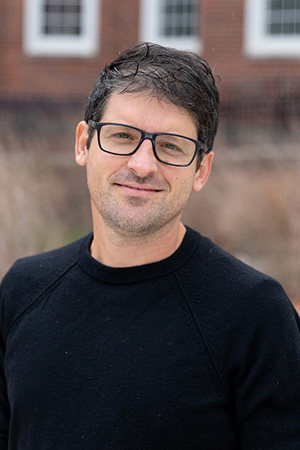
Eugenio Di Stefano
- Professor
- 402.554.4841
Additional Information
Biography
Eugenio Di Stefano is a Professor of Latin American Literature and Culture in the Department of World Languages and Literature and a member of OLLAS (Office of Latino/Latin American Studies). He has published articles on the politics of aesthetic form in contemporary Latin American cultural production in MLN, Revista de Estudios Hispánicos, and Nonsite. He is the author of the book, The Vanishing Frame: Latin American Culture and Theory in the Postdictatorial Era (University of Texas Press) and is currently working on a book manuscript titled Dead Time: Capturing the Forms of the Latin American Present. He is also a founding editor of FORMA, an online journal dedicated to rethinking contemporary Latin American culture and theory.
Education
- Ph.D, Hispanic Studies, University of Illinois at Chicago, 2010
Research Interests
- Contemporary Latin American Literature and Film
- Twentieth- and Twenty-First Century Mexican Literature
- Nineteenth-Century Latin American Literature
- Critical Theory, Literary Theory
- Latin American Testimonio
- Disability Theory, Twentieth-Century American Literature
- Global Cinema
- Human Rights Literature and Film
- German Idealism
Publications
The Vanishing Frame: Latin American Culture and Theory in the Postdictatorial Era. University of Texas Press. August 2018.
“The Art of the Game: Carlos Reygadas’s Serenghetti.” Praktyka Teoretyczna 4.50 (Spring 2024) : 75-108.
“Why You Might Want to Pay Attention to Autonomy: A Response to José Eduardo González.” Nonsite.org. (Winter 2021): n. pag. Web.
"Toward an Aesthetics of Dead Time in Carlos Reygadas’s Japón." Forma 1.1 (Fall 2019) : n. pag. web.
"The Logic of Torture in Post-Historical Times: A Response to Erin Graff Zivin’s Figurative Inquisitions." Deinós. 4 (Dec. 2018) : n. pag. Web.
"Forms of Freedom in Pablo Larraín’s No and Neruda." Open Library of the Humanities. Eds. Alexander Beaumont and Adam Kelly. October 2018.
"Mexican Working-Class Literature or The Work of Literature in Mexico." Working-class Literature(s). Eds. Magnus Nilsson and John Lennon. Stockholm University Press. December 2017.
"'La furia de la material:' Freedom, Form, and the Contemporaneity of Modernism in Latin America." With Emilio Sauri. The Contemporaneity of Modernism. Eds. Michael D’Arcy and Mathias Nilges. Routledge. November 2015.
"Disability and Latin American Cultural Studies: A Critique of Corporeal Difference, Identity and Social Exclusion." Canadian Journal of Disability Studies. 4.2 (2015) : n.pag. Web.
"Making it Visible: Latin Americanist Criticism, Literature and the Question of Exploitation Today." With Emilio Sauri. Nonsite.org. 13 (Fall 2014) : n. pag. Web.
Additional Information
Biography
Eugenio Di Stefano is a Professor of Latin American Literature and Culture in the Department of World Languages and Literature and a member of OLLAS (Office of Latino/Latin American Studies). He has published articles on the politics of aesthetic form in contemporary Latin American cultural production in MLN, Revista de Estudios Hispánicos, and Nonsite. He is the author of the book, The Vanishing Frame: Latin American Culture and Theory in the Postdictatorial Era (University of Texas Press) and is currently working on a book manuscript titled Dead Time: Capturing the Forms of the Latin American Present. He is also a founding editor of FORMA, an online journal dedicated to rethinking contemporary Latin American culture and theory.
Education
- Ph.D, Hispanic Studies, University of Illinois at Chicago, 2010
Research Interests
- Contemporary Latin American Literature and Film
- Twentieth- and Twenty-First Century Mexican Literature
- Nineteenth-Century Latin American Literature
- Critical Theory, Literary Theory
- Latin American Testimonio
- Disability Theory, Twentieth-Century American Literature
- Global Cinema
- Human Rights Literature and Film
- German Idealism
Publications
The Vanishing Frame: Latin American Culture and Theory in the Postdictatorial Era. University of Texas Press. August 2018.
“The Art of the Game: Carlos Reygadas’s Serenghetti.” Praktyka Teoretyczna 4.50 (Spring 2024) : 75-108.
“Why You Might Want to Pay Attention to Autonomy: A Response to José Eduardo González.” Nonsite.org. (Winter 2021): n. pag. Web.
"Toward an Aesthetics of Dead Time in Carlos Reygadas’s Japón." Forma 1.1 (Fall 2019) : n. pag. web.
"The Logic of Torture in Post-Historical Times: A Response to Erin Graff Zivin’s Figurative Inquisitions." Deinós. 4 (Dec. 2018) : n. pag. Web.
"Forms of Freedom in Pablo Larraín’s No and Neruda." Open Library of the Humanities. Eds. Alexander Beaumont and Adam Kelly. October 2018.
"Mexican Working-Class Literature or The Work of Literature in Mexico." Working-class Literature(s). Eds. Magnus Nilsson and John Lennon. Stockholm University Press. December 2017.
"'La furia de la material:' Freedom, Form, and the Contemporaneity of Modernism in Latin America." With Emilio Sauri. The Contemporaneity of Modernism. Eds. Michael D’Arcy and Mathias Nilges. Routledge. November 2015.
"Disability and Latin American Cultural Studies: A Critique of Corporeal Difference, Identity and Social Exclusion." Canadian Journal of Disability Studies. 4.2 (2015) : n.pag. Web.
"Making it Visible: Latin Americanist Criticism, Literature and the Question of Exploitation Today." With Emilio Sauri. Nonsite.org. 13 (Fall 2014) : n. pag. Web.